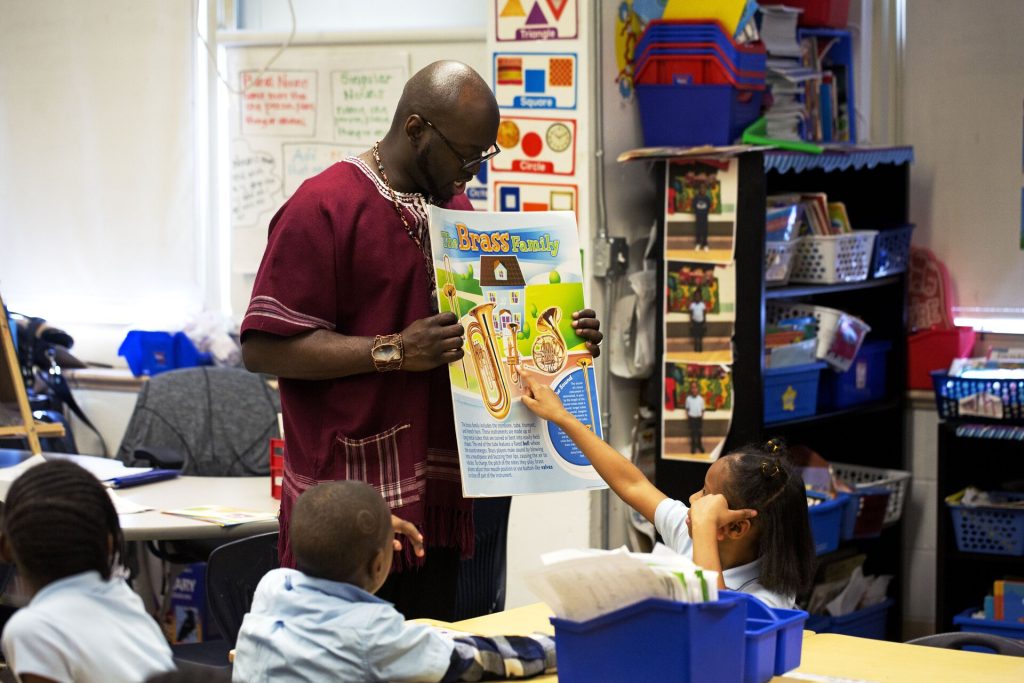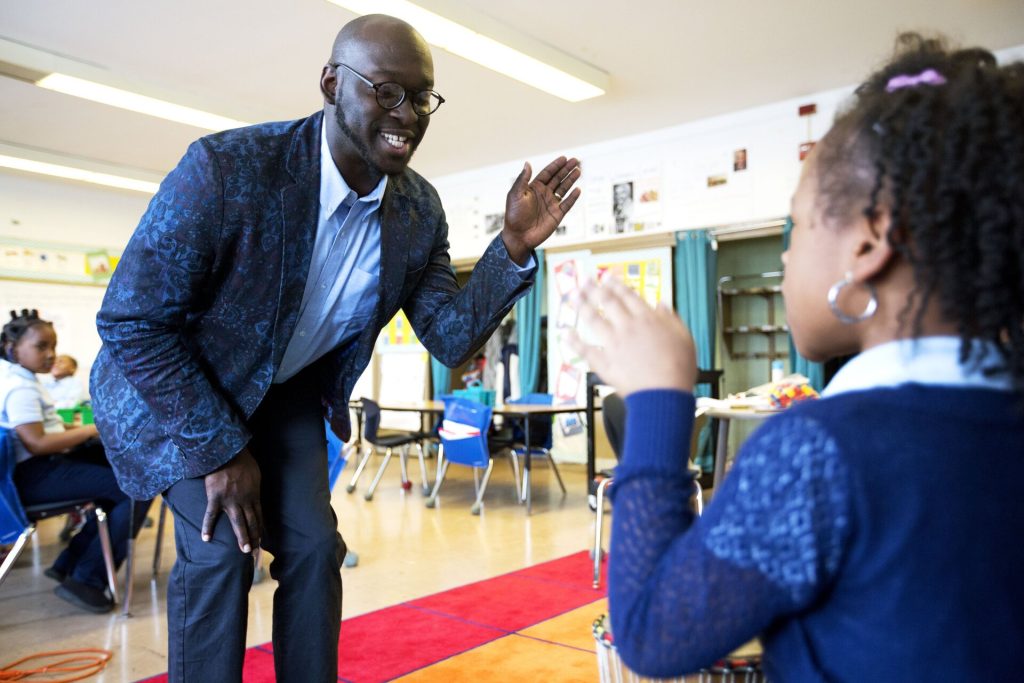
Shantram Hawkins’ life had always been leading up to this moment.
As a child, the music instructor would lose himself in his stepfather’s antique piano shop. Try as he might, nothing could keep Shantram from those keys.
Ultimately, his stepfather gave in and moved a piano into the house. At that moment, it was like something clicked. Playing piano became Shantram’s outlet, his obsession. In grade school, he won an art competition after drawing a picture of himself playing. Above the picture, he scribbled two words: Piano teacher.
“I realized that music was my purpose. It was past desire, past passion, so I decided to teach and share that love,” he says.
Three degrees later, Shantram is striking a chord at the LEARN South Chicago Campus, where he teaches piano, ensemble singing, African drumming, music appreciation and music theory. And it’s not just for cheap “trills.” Student engagement is over 90 percent in Shantram’s classrooms, which, at any moment, may fill with the hypnotic beat of djembe drums or the cascade of classical string music.
The energy there is palpable, but the Education Specialist grad-turned-Doctor of Education student is always looking to take things higher — which brings us to his journey with ������Ƶ.
������Ƶ: After getting your degree, your classroom engagement went up 20%. How did your ACE experience help you connect with your students?

Shantram Hawkins (SH): For one of my assignments, I looked at the traditional learning styles of student learners such as visual-spatial learning, where you prefer using pictures, or oral-auditory, where you prefer using sound or music. Then there’s verbal-linguistic, where you use speech and writing; physical, where people use their hands and bodies; [and] logical-mathematical, where you prefer using mathematical models and reasoning systems. And then you have social or interpersonal, where you prefer to learn in groups, and you have solitary or intrapersonal learning, where you like learning and studying alone. ACE really equipped me to utilize all these things…and if you use the seven different learning styles and find a way to incorporate every last one of them into your teaching, it’ll excel the classroom and you’ll get engagement over 90 percent.
ACE: Having those techniques in your toolbox obviously helped bridge learning gaps, but what about resource gaps? How did your education help you deal with issues that are more systemic?
SH: One of the things that we talk about at ACE is the importance of partnerships with stakeholders and partnerships with the community, so one of the things I decided to do and will be doing more of this year is partnerships with community churches to where each church can give me a set amount of dollars so I can do things I would like to do—more play productions, more instruments, things like that. Right now, I purchase them either personally or I ask for help from the staff or principal but this year, I’ll be doing more outreach.
ACE: Do you think you’ve gained confidence since completing your Ed.S. and starting your Ed.D.?
SH: Absolutely, yes. Whenever there’s an opportunity to illustrate or teach teachers how I do things, I take advantage of that moment. Every time we have a staff meeting, they’ll come up with a concept or problem and I’ll tell them what I’ve used to work through the issue, what theories prove that this works, or this [approach] doesn’t have any substance because the data doesn’t prove it.
I’ve also taken classes on social justice and advocacy, and now I’m an advocate to the fullest. Sometimes, we have students who work on everyone’s nerves, but when you’re dealing with teachers who don’t have an idea of trauma, that’s when my advocacy studies reach in.
ACE: What’s the main thing you’ve taken away from your advocacy studies?
SH: It’s not about changing the kids; it’s about changing the mindsets of teachers and the staff that serves the kids. You change the mindset, and the culture will automatically change. And people need training. I’m actually going to send an email to my principal because I want all teachers trained on trauma. I want people to learn about urban culture. I want a training on fetal alcohol syndrome. I want a training on autistic learners. I want a training on ADHD learners.

ACE: Have you always been this purpose-driven?
SH: When my [childhood] teachers found out I was teaching and working in a school, they were like, “H�Ƿ�?” Because I was the classroom clown. I was that student making C’s, D’s and F’s, and it’s like “H�Ƿ�?” I used to have to be the center of attention at all times, but what got me to be calm and focused was I started realizing that my purpose was lining up for me. I know my purpose is to change the mindsets of the community and the people I serve, because I believe that there’s a better life than projects, smoking, drinking, gang-banging, you know, these are things that I see all the time. Those are the kids who I go after the most. You’re not going to be suspended. You are going to be somebody. You’re going to do well.
ACE: Is that sense of leadership what brought you back for your Ed.D.?
SH: You know, one of my counseling mentors told me…the world needs to see a Dr. Shantram Hawkins, and that just stuck with me and I knew it was time to go forward. And the way the classes were set up, it was like they were designed for me personally. I liked the structure of them, I liked the way teachers gave feedback. I attended [a different] online college and all we did was work, work, work, but nothing was really applicable or practical. At ACE, our assignments are geared to provide application right now.
ACE: What does the next step look like for you? One, five, 10 years down the line?
SH: I think I know my next passion: I’m going to be a principal.
Learn more about the education specialist and doctoral degree programs at ������Ƶ.

